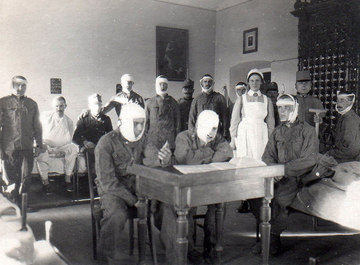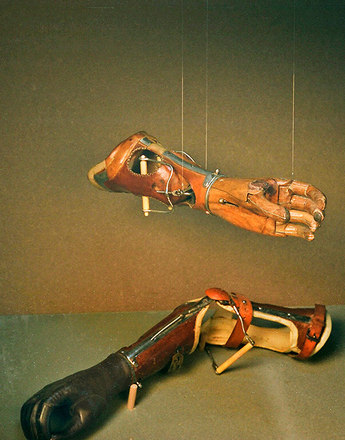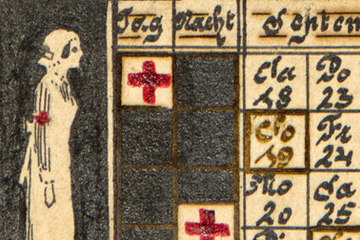-

The wounded being treated in a field hospital: removal of shell splinters, photo
Copyright: Heeresgeschichtliches Museum, Wien
Partner: Heeresgeschichtliches Museum -

Nurses treating a wounded soldier in a military hospital, photo
Copyright: Heeresgeschichtliches Museum, Wien
Partner: Heeresgeschichtliches Museum
Doctors were not occupied exclusively with tending the wounded or treating infectious diseases at the front and behind the lines. Their involvement in the army disciplinary apparatus and their participation in the development of new weapons are further aspects that should be recalled.
Because of the immense number of wounded or diseased soldiers and the war-related food shortages behind the lines, medicine was of particular importance. By treating and examining the sick or wounded soldiers, doctors were also indirectly involved in the enforcement of military discipline. They were responsible for determining whether a soldier was sick or healthy. Army doctors decided whether and for how long a wounded soldier could remain in hospital, whether he could return to the front, or whether he should be sent home. The treatment was to be regarded as a military order that had to be obeyed. Doctors were the military superiors of their patients. They decided whether a soldier was really sick or just faking and hence whether or not he should be disciplined. Many soldiers who had been gassed or suffered from shell shock were thought to be shirkers.
The close interaction between medicine and war can be seen clearly in the investigation of chemical weapons. The use of poison gas required comprehensive knowledge of its effects on the human body. Animal experiments were carried out to determine the fatal dosage and to investigate the characteristics and consequences of gas injury. The study of treatments to relieve and deal with gas injuries was also used to develop chemical weapons, and vice versa. The boundaries between the two research areas were blurred.
One example of the involvement of doctors in war research is the Viennese electropathologist and expert in electricity accidents Stefan Jellinek. In 1916 he was ordered by the Ministry of War to investigate the physiological effects of high-voltage fences. With electrical engineers from the University of Technology, he developed electrical barriers, electrically charged wire entanglements to stop enemy soldiers and deserters on the Isonzo front.
During the First World War the exploitation of medical knowledge for military purposes reached a new dimension. Medicine was not only used for humanitarian purposes but was also directly involved in the war and played a decisive role in its progress.
Translation: Nick Somers
Hofer, Hans-Georg: Mobilisierte Medizin. Der Erste Weltkrieg und die Wiener Ärzteschaft, in: Pfoser, Alfred/Weigl, Andreas (Hrsg.): Im Epizentrum des Zusammenbruchs. Wien im Ersten Weltkrieg, Wien 2013, 302-309
Schwarz, Peter: „Die Opfer sagen, es war die Hölle.“ Vom Tremolieren, Faradisieren, Hungern und Sterben: Krieg und Psychiatrie in Wien, in: Pfoser, Alfred/Weigl, Andreas (Hrsg.): Im Epizentrum des Zusammenbruchs. Wien im Ersten Weltkrieg, Wien 2013, 326-335
Eckart, Wolfgang U./Gradmann, Christoph (Hrsg.): Die Medizin und der Erste Weltkrieg. 2. Auflage, Herbolzheim 2003
Eckart, Wolfgang U./Gradmann, Christoph: Medizin im Ersten Weltkrieg, in: Spilker, Rolf/Ulrich, Bernd (Hrsg.): Der Tod als Maschinist. Der industrialisierte Krieg 1914-1918. Eine Ausstellung des Museums Industriekultur Osnabrück im Rahmen des Jubiläums „350 Jahre Westfälischer Friede“ 17. Mai – 23. August 1998. Katalog, Bramsche 1998, 203-215
Eckart, Wolfgang U./Gradmann, Christoph: Medizin, in: Hirschfeld, Gerhard/Krumeich, Gerd/Renz, Irina (Hrsg.): Enzyklopädie Erster Weltkrieg, Paderborn et al. 2009, 210-219







